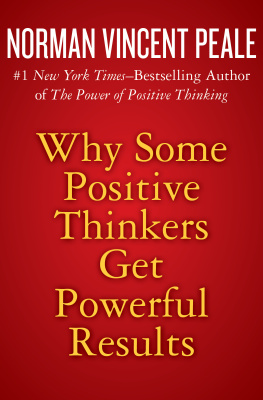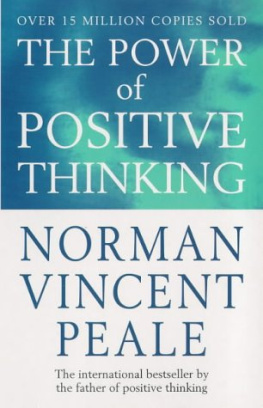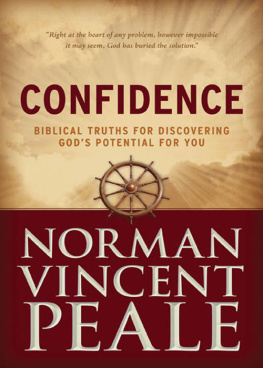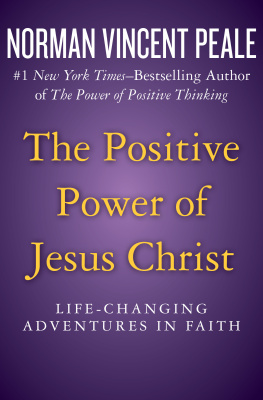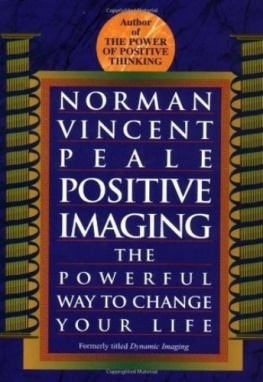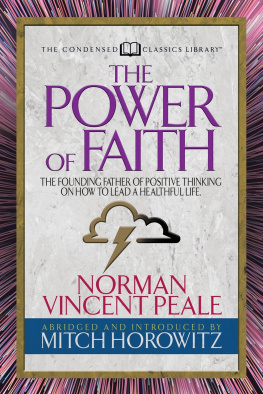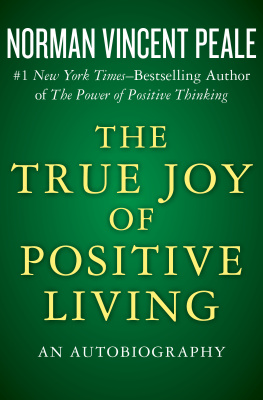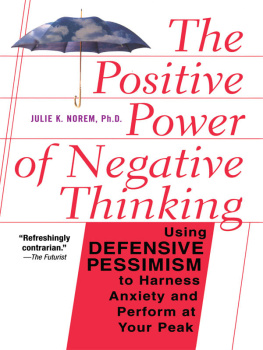Why Some Positive Thinkers Get Powerful Results
Norman Vincent Peale

To the Reader
Of course you want good resultsin doing your job, in reaching your goals, in maintaining good health, and in living your life in general. Here is good news for you: good results can be yours. How? Over years of observing people who attained successful living, I long ago came to the conclusion, based on factual knowledge, that positive thinkers inevitably get positive and powerful results.
So certain am I that there is a definite relationship between positive thinking and positive or good results that I think an invariable scientific formula is involved. Explicitly stated it is this: think positively, act positively, image positively, pray positively, and believe positively, and powerful results will be yours. Helping you learn how to achieve powerful results, according to this formula, is the purpose of this book.
I hope you will stay with me in a reader-author team by reading this book from beginning to end. I have explored practical, workable methods of positive thinking that will greatly enhance your life. By long study and experience I have discovered some simple principles that have worked for me and many others, when they are applied. It is also my pleasure to outline some of the amazing things I have personally found about the power of positive thinking, which I first wrote about many years ago in The Power of Positive Thinking and expanded later in other books. So let us proceed to the consideration of an exciting questionthe answers to which can improve anyones lifewhy some positive thinkers get powerful results.
I wish to express great appreciation to the two dedicated persons who helped immeasurably with this manuscript. One is my secretary, Sybil Light, who meticulously prepared it, and the other, my wife Ruth, who expertly edited it.
Norman Vincent Peale
To
MYRON L. BOARDMAN,
longtime friend
and associate,
with appreciation
and affection
Contents
Ive Got It Made
Im glad that I have never been able to say or even to think that Ive got it made. Im still dreaming, still planning, still trying, still working, and everything is continuously exciting.
We hear people say, At last Ive got it made. About achievers we admiringly exclaim, He has made it to the top. Hes got it made. Or She has hit the jackpot. That woman sure has everything. So it goes!
But I have sometimes noted something sad about got-it-maders; a certain quality seems to have gone out of them. The incentive, the drive, the motivation that took them to the top has declined. The old thrill and excitement of achievement arent like they once were. Now that these people have got it made, the challenge has dimmed, and maybe the enjoyment of getting there doesnt live up to expectations. As one top achiever complained, There isnt much fun in life anymore. No challenges or problems like there were.
The president and chief executive officer of one of the most famous corporations in America had a spectacular rise in business. At thirty-five he was top man in a highly competitive industry. He had it made, or so it seemed. At forty he was tiring of it all, and at forty-five hed had it, to quote his downbeat evaluation of his career. From now on, he complained, Ive just got to hold my own, keep some fellow from pushing me off my chair. It was a lot more interesting when I was fighting my way up the hard way. Those were the great days of my life. It isnt the same anymore.
But other men and women are geared differently. Having achieved one goal, they set another and repeat the old tried and true success pattern. They come up with fresh achievements. Having fulfilled old dreams, these people latch onto fresh dreams, bigger challenges, more exciting objectives. Thus it is that they have a perpetual delight in living and working and winning. Their enthusiasm never runs down. Theirs is a constantly renewing and exciting experience. Always they are zestful, eager, creative. They never have it made; they are always striving to make it.
The true flavor, the real fun, the continuous excitement is in the process of making it rather than in having made it. Happiness actually is found in striving for a goal rather than in settling down to enjoy the attained objective. It is found in setting another goal and enthusiastically going for that goal in the same old competitive, innovative spirit.
Happiness at last comes to those who never lose the excitement of going after new goals, who are forever wanting to achieve something better. If you are a winner in a big way or even in a moderate way, you may conclude that since you have it made, you may rest upon your laurels. Be careful, for the result of doing that can be no more laurels. Perhaps more important, there may be no more of the joy of striving.
One of the most genuinely happy men I ever knew was the late Amos Parrish, perhaps the top sales idea expert in the department store industry. Though he stuttered all his life, store executives would come annually to A. P.s lectures, packing the grand ballroom of a big New York City hotel to listen to him talk about marketing. This was an outstanding and remarkable achievement, but it was only one of his goal realizations. Even as he grew older, his mind was alert, constantly delivering amazing new ideas. When I would compliment him on some big success, he would brush it aside. Listen to this idea Im working on now. This is a h-h-honey, he would excitedly stutter.
When word came that he was dying at ninety-four years of age, I telephoned him. I always loved him and owed him much because he had always inspired me. Hey there, he said with his usual enthusiasm, Ive got a new idea. This one is a beaut. And he went on to outline an exciting new goal. There was, of course, no talk of dying, only talk about the excitement of living. But two days later he was dead of a progressive disease. A. P. never really had it made, though he was a very successful businessman. He was always involved in the further making of it and having the time of his life in the process.
This unique, unforgettable man brings to mind another equally remarkable friend, the famous baseball executive Branch Rickey. He was successively head of the Saint Louis Cardinals, the former Brooklyn Dodgers, and the Pittsburgh Pirates. His book, The American Diamond, is a classic on the game of baseball. At a dinner celebrating Branch Rickeys fifty years in baseball, a reporter asked him, What was your greatest experience in your half-century in this great American sport? Pulling down his beetling eyebrows, Rickey snapped, Dont know. I havent had it yet. Despite his many distinguished achievements, this man would never assume he had it made. To him it was always still in the making. As a result, his career went from one higher level to another, there being no halting of his achievements.
I was the speaker on a recent Sunday morning in the Crystal Cathedral in Garden Grove, California. This amazing structure was crowded to overflowing by a congregation, according to the newspapers, numbering eleven thousand people in two services and filling every auditorium on the campus. Surrounded by landscaped grounds where sparkling fountains toss their spray, this huge steel and glass church is the spiritual home of millions who receive its message weekly by television.
My presence was occasioned by the observance of the thirtieth anniversary of Dr. Robert Schuller, the minister who, beginning with five hundred dollars and a lot of faith, built this great church. On this special Sunday Dr. Schuller announced plans for another center to serve family needs. One might have thought that he too had it made, but for a unique group of positive people there are always new goals to be built on old goals already achieved.
Next page
